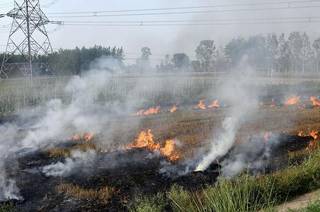With government interventions proving either too expensive or inadequate, Punjab’s farmers have begun burning crop residue, raising fears of pollution.
As autumn sets in, farmers in Punjab have begun harvesting the kharif paddy crop and preparing the fields for the winter crop.
And as has been the practice, despite official injunctions, paddy stubble is being set on fire, raising fears of a spike in air pollution across the northern States, including the national capital New Delhi. Aggravating the problem is the retreat of the southwest monsoon, setting off north-westerly winds which blow into the plains, carrying the smoke from the stubble.
Paddy is grown on 30 lakh hectares in Punjab. After harvesting, about 20 million tonnes of paddy straw is left in the fields. It is estimated that 15 million tonnes of paddy straw are burnt every year. On a sunny afternoon, a group of six farmers in their sixties in Rolu Majra village in Rupnagar district are weighing the options for disposing the paddy stubble. Burning the crop residue is the “unanimous” decision, unless there is financial compensation from the government.
Stubble burning, close to the autumn season every year has been a key contributing factor to air pollution and to respiratory problems among people.
Prohibitive costs
In an effort to solve the problem of stubble without burning, the State government has provided agro-machines and other equipment, including mulchers and choppers, at subsidised rates to farmers and cooperative societies with a Central outlay of around around ₹650 crore for 2018-2020.
However, farmers and agri-experts feel the number of machines is inadequate. Besides the high cost of using them, given the rising costs of diesel, will not serve the purpose of putting an end to stubble burning, at least during the ongoing harvesting season.
Admitting farmers’ concern, Lakhbir Singh, a member of the Rolu Majra Co-operative Society, says, “One Happy Seeder machine is inadequate. Many more such machines are required to effectively check stubble burning.”
There are around 3,500 co-operative societies in the State.






Leave a reply